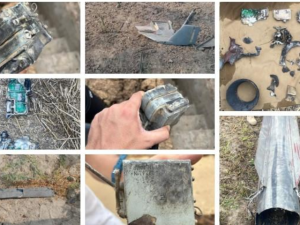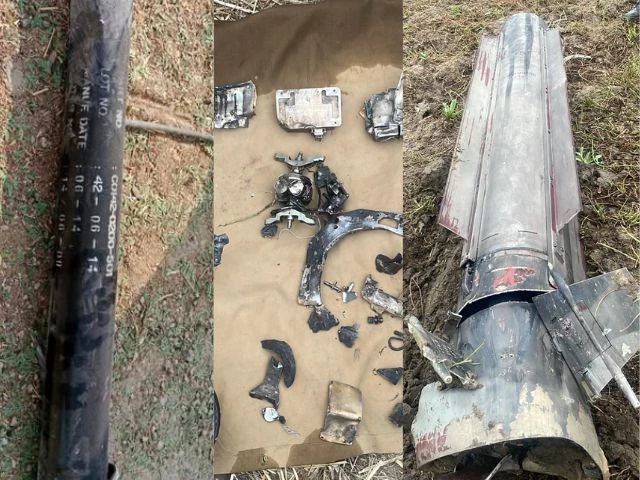The Pakistan armed forces have successfully taken down 25 Israeli-made Harop drones that India deployed in recent cross-border operations, as reported by the Inter-Services Public Relations (ISPR) on Thursday.
According to the military’s media wing, these drones were intercepted using a combination of electronic countermeasures (soft-kill techniques) and traditional weaponry (hard-kill systems) after being spotted over various regions in Pakistan.
The ISPR described these drone incursions as a “desperate and panicked response” from India, following Pakistan’s counteractions on May 6 and 7, which resulted in the downing of five Indian fighter jets and targeted several military installations.
The statement from ISPR also mentioned that debris from the Israeli-made drones is being collected from different sites within Pakistan. They added that India has faced significant losses along the Line of Control (LoC) in recent days.
“The Pakistan Armed Forces are taking strong action against all hostile activities and are consistently thwarting enemy plans,” the statement emphasized.
Earlier that day, Lieutenant General Ahmed Sharif Chaudhry, the Director General of Inter-Services Public Relations (DG ISPR), announced that the Pakistan armed forces had intercepted and neutralized 12 Indian drones across various locations.
During a press briefing, the military spokesperson noted that on May 7 and 8, Indian drones attempted to intrude into several areas of the country. “Last night, India committed yet another blatant act of military aggression against Pakistan by deploying Harop drones at multiple sites,” he stated.
The drones were effectively neutralized in cities including Lahore, Gujranwala, Rawalpindi, Chakwal, Bahawalpur, Mianwali, Karachi, Chor, Miano, and Attock, as reported by the DG ISPR.

He went on to say that a 13th drone had partially hit a military target near Lahore, resulting in minimal damage to the equipment.
“Four personnel from the Pakistan Army were injured in a drone strike in Lahore, and sadly, one civilian lost their life in Miano, Sindh,” the spokesperson reported.
The military spokesperson described these actions as part of a persistent pattern of aggression and emphasized that Pakistan’s forces are on high alert to protect the country’s airspace and territorial integrity.
In reference to the destruction of five Indian aircraft by the Pakistan Air Force, the DG ISPR remarked that India “seems to have lost its way” and has faced significant losses along the Line of Control (LoC).
He stressed that the international community can clearly see the troubling path India is taking with these provocative military actions, which pose a threat not only to regional stability but also to global security as a whole.
The recent drone strike comes on the heels of an Indian missile attack that tragically claimed the lives of 31 people and injured 57 across various locations in Pakistan. New Delhi has labeled this strike as a response to an assault on April 22 that resulted in the deaths of 26 tourists.
Pakistan and India’s National Security Advisers have made contact
In the meantime, the National Security Advisers from Pakistan and India have reached out to each other following a series of missile strikes by India inside Pakistan and Azad Jammu Kashmir (AJK) early Wednesday morning.
Pakistan’s NSA, Lt General Asim Malik, who also serves as the Director General of ISI, had a conversation with his Indian counterpart, Ajit Doval, in what appears to be an effort to de-escalate tensions, according to officials who are in the know.
“Yes, the National Security Advisers of Pakistan and India are in communication,” Deputy Prime Minister and Foreign Minister Ishaq Dar shared with The Express Tribune.
He refrained from providing further details about the discussions or the purpose of the contact between the two NSAs.
A Pakistani official mentioned that maintaining such communication channels is crucial during times of crisis.
It is believed that these contacts were established after intense diplomatic efforts from both international and regional players.
US Secretary of State Marco Rubio, who also holds the NSA position, reached out to both the Pakistani and Indian NSAs shortly after the Indian missile strikes and Pakistan’s subsequent response.
For the latest updates and insights on new developments, visit the NEWSON
Q1. How many drones did Pakistan intercept in the recent India-Pakistan escalation?
Pakistan’s armed forces intercepted and destroyed 25 Israeli-made Harop drones deployed by India in cross-border operations, according to the Inter-Services Public Relations (ISPR) on May 8, 2025.
Q2. What type of drones were used by India in the attack?
India used Israeli-made Harop drones, also known as loitering munitions, which are designed to hover over targets and self-destruct upon impact, making them highly lethal in precision strikes.
Q3. How did Pakistan counter the drone attack?
Pakistan used a combination of electronic warfare (soft-kill techniques) and hard-kill defense systems (including kinetic weapons) to intercept and neutralize the intruding drones.
Q4. Which Pakistani cities were affected by the Harop drone incursions?
The drones were detected and taken down across multiple cities and regions, including:
-
Lahore
-
Gujranwala
-
Rawalpindi
-
Chakwal
-
Bahawalpur
-
Mianwali
-
Karachi
-
Chor and Miano (Sindh)
-
Attock
Q5. Were there any casualties in the drone attacks?
Yes. One civilian was killed in Miano, Sindh, and four Pakistan Army personnel were injured in Lahore when a drone partially hit a military facility.
Q6. Why did India launch Harop drone strikes on Pakistan?
According to ISPR, the drone strikes are seen as a “desperate and panicked” reaction by India following Pakistan’s downing of five Indian fighter jets and strikes on Indian military installations on May 6–7, 2025.


